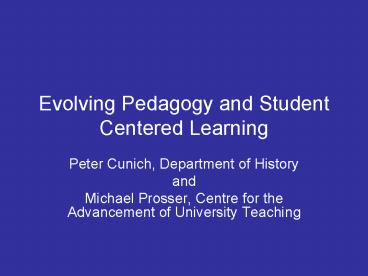Evolving Pedagogy and Student Centered Learning - PowerPoint PPT Presentation
1 / 13
Title:
Evolving Pedagogy and Student Centered Learning
Description:
Evolving Pedagogy and Student Centered Learning. Peter Cunich, Department of History ... Michael Prosser, Centre for the Advancement of University Teaching ... – PowerPoint PPT presentation
Number of Views:53
Avg rating:3.0/5.0
Title: Evolving Pedagogy and Student Centered Learning
1
Evolving Pedagogy and Student Centered Learning
- Peter Cunich, Department of History
- and
- Michael Prosser, Centre for the Advancement of
University Teaching
2
(No Transcript)
3
1. Brief review of Melbourne Design Forum,
2007 2. Brief outline of some recent developments
in approaches to learning and teaching
internationally 3. Introduction to HKUs
Educational aims and Learning outcomes as an
example of changing expectations of university
education 4. Outline some examples of real
learning and teaching activities consistent with
the changing approaches and expected outcomes 5.
Identity characteristics of learning and teaching
spaces which afford the sorts of approaches,
achievement of aims and learning outcomes and
learning and teaching activities outlined
4
Melbourne Design Forum 2007
- Design spaces to suit
- Teacher-Student interactions
- Student-Content engagement
- Student-Student communication
- Formal Informal learning environments
- Flexibility of learning spaces
- Better utilization of IT AV devices
- Using space to motivate learning interaction
- Alignment of LEARNING SPACE LEARNING OUTCOMES
5
Changing Approaches to Learning and Teaching in
Higher Education Around the world, there is a
change in the way learning and teaching is being
approached, to meet changing expectations of a
university education. More inquiry based, small
group approaches are being adopted to complement
more traditional approaches, with the aim of
achieving the changing aims and outcomes of
university education. The change in approach is
often described as moving from more
teacher-centered, passive learning approaches to
more student-centered, active learning approaches
6
(No Transcript)
7
4-YEAR UNDERGRADUATE CURRICULUM REFORM THE
UNIVERSITY OF HONG KONG Institutional Aims and
Learning Outcomes To enable students to develop
capabilities in 1. pursuit of
academic/professional excellence, critical
intellectual inquiry and lifelong learning 2.
tackling novel situations and ill-defined
problems 3. critical self-reflection and greater
understanding of others 4. intercultural
communication, multi-cultural understanding and
global citizenship 5. communication and
collaboration 6. leadership and advocacy for the
improvement of the human condition
8
1. The pursuit of academic/professional
excellence, critical intellectual inquiry and
lifelong learning
- Analyse complex issues and make informed
judgements - PHIL1005 Critical Thinking and Logic
- Access, evaluate, synthesize and use information
in a range of media - YHIS0007 Hong Kongs Prehistory and Early
History A Multi-Disciplinary Approach
9
2. Tackling novel situations andill-defined
problems
- Think creatively and laterally to generate
innovative solutions to problems - HIST3022 History by Numbers Quantitative
Methods in History - Apply knowledge and skills acquired in the
disciplinary and interdisciplinary studies to new
situations - ENGL2096 Creative Writing
10
3. Critical self-reflection and greater
understanding of others
- Identify personal strengths and weaknesses
- HIST2081 Gender and History Beauty, Fashion and
Sex - Maintain a positive concept of self as capable
and autonomous - HIST2070 Stories of Self History through
Autobiography
11
4. Develop capabilities in intellectual
communication, multi-cultural understanding and
global citizenship
- Demonstrate interpersonal skills for establishing
relationships with people of diverse cultures - Demonstrate and awareness of the
interconnectedness of local and global concerns - HIST2080 Classroom Across the Pacific American
History and Anthropology
12
5. Develop capabilities in communication and
collaboration
- Build positive working relationships with team
members - Work independently as well as in teams
- HIST2065 Workshop in Historical Research
13
- In small groups, take one HKU Aim and set of
learning outcomes and - Identity characteristics of learning and teaching
spaces which afford the sorts of approaches,
achievement of aims and learning outcomes and
learning and teaching activities outlined - Plenary, we will ask each group to report on
their characteristics































